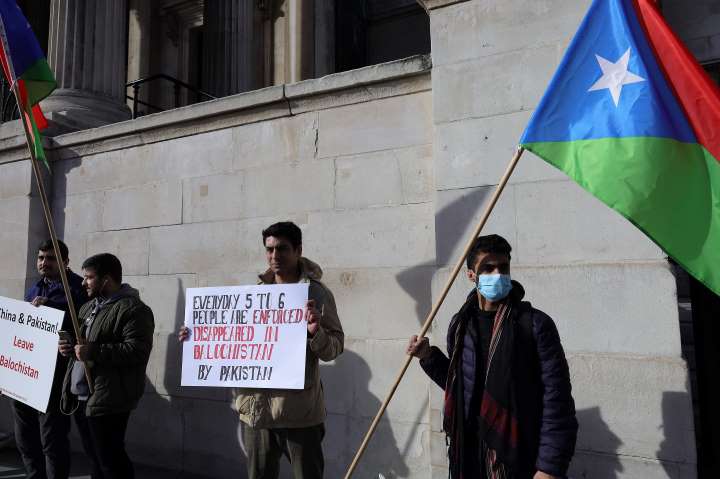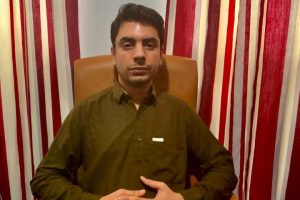

Jamal Nasir Baloch (centre) protests against Pakistan at Trafalgar Square in London (Photo: Rahul Kumar)
On 27th March 1948, when several nations in South Asia were enjoying their status of freedom, one nation was being colonised again. Balochistan declared its independence on 11th August 1947 before India and Pakistan. But Pakistan and Britain never wanted Balochistan to become a free country and in barely nine months it was colonised by Pakistan with force.
Both Pakistan and Britain deceived Balochistan even after accepting its sovereign status by signing two treaties. On 4 Aug 1947, officials from the kingdom of Kalat, Pakistan and the UK decided that Kalat will remain independent and secondly, on 11 Aug 1947, Pakistani officials accepted Kalat as an independent sovereign state.
Today marks 75 years of occupation of Balochistan and to discuss the history and future of Balochistan, I interview Jamal Nasir Baloch, currently head of Foreign Affairs Department of Free Balochistan Movement (FBM). It is a political party headed by Hyrbyair Marri, son of late Nawab Khair Baksh Marri who is fighting for independent Balochistan.


Excerpts from the interview:
IN: 27 March will mark 75 years of occupation of Balochistan by Pakistan. As a Baloch and representative of FBM, where do you feel circumstances went against the Baloch?
JB: Pakistani occupation of the eastern part of Balochistan was not an isolated geopolitical event because Pakistan occupied Balochistan with the complete backing and consent of the British Empire. When Britain could not financially afford to continue the colonisation of India due to World War Two, they divided India in the name of Islam and created the first Islamic state, Pakistan, after the fall of the Ottoman Empire.
Baloch rulers at the time did not understand the geopolitics of their region, and they also relied upon non-Baloch people to run their legal and political affairs. For example, M.A. Jinnah, a Gujarati Muslim, was employed as a lawyer by the Baloch state to fight our legal case. Jinnah presented Balochistan’s memorandum to the Cabinet Mission in 1946 to remind the British Empire that Balochistan is a non-Indian state and that after British withdrawal Balochistan shall regain her independence. Similarly, Khan of Kalat, the sovereign of Balochistan, employed Indian Muslims to run his government and a British was employed to run his foreign affairs department. Instead of educating their own youth and creating internal capacity to run a state, unfortunately, Baloch elites relied on foreigners who then betrayed them and Balochistan.
Secondly, because Pakistan was created by the British Empire to serve its geopolitical aims that’s the reason why Britain systematically created legal and geopolitical opportunities for Pakistan to invade and occupy Balochistan. In Indian Independence Act 1947, Britain gifted Balochistan’s leased areas to its new dominion Pakistan. Moreover, when Balochistan’s parliament rejected Pakistan’s offer for a merger and voted for independence, instead of supporting the democratic mandate of Balochistan, Britain supported Pakistan. Britain was a guarantor of Balochistan’s independence in the Kalat-Britain Treaty of 1876. The treaty was the reason why Britain could put their troops on Balochistan’s territory or use Balochistan’s land. Due to the 1876 Treaty, the British Empire built one of the largest British military bases in the world in Quetta, Balochistan.
The British Empire used Balochistan’s territory during World War One and World War Two but they violated the treaty when the Baloch nation needed them. According to the Treaty of 1876’s article 3, the United Kingdom was legally obliged to support Balochistan independence from any external threat. Britain not only violated the treaty but also supported Pakistan against Balochistan. Britain sowed the seed of Balochistan’s occupation in the Indian Independence Act of 1947 that gave Balochistan leased territories comprising British Balochistan to Pakistan and then the Pakistan army under the leadership of a British subject Douglas David Gracey invaded Balochistan.
IN: According to an article, China did outreach to Baloch nationalists to safeguard their personnel and projects. Did the Chinese reach out to FBM, if yes, who reached out to you?
JB: China is engaging with Baloch parties that are collaborating with the Pakistani state. These Baloch parties are receiving benefits and contracts from the Chinese state. As far as I am aware, China reached out to Akhtar Mengal and his political fronts that operate under the guise of independence but in reality, these groups are part and parcel of BNP Mengal. We do not consider these groups genuine freedom seekers. I am not aware of Chinese engagement with any real pro-independence Baloch group. China is currently supporting Pakistan against Balochistan and Baloch nation. China is not a neutral power in our region and they have already chosen a side against the Baloch nation and Balochistan. Therefore under these circumstances, we cannot engage with China.
IN: Canadian Barrick Gold has taken over Reko Diq mines. Do you think they will be fair in their dealings with Balochistan?
JB: Balochistan is a colony of Pakistan, it is an occupied territory. There is no difference between Canadian Barrick Gold and Chinese MCC in Balochistan. Pakistan is the master, they are the beneficiary of all deals. Baloch nation remains the most underdeveloped nation despite Balochistan being one of the richest countries in terms of natural resources.
IN: Under FBM’s policy, Balochistan also comprises Iranian Balochistan. What can you tell us what has been happening in Iranian side i.e Sistan Balochistan especially after the Zahedan incidence?
JB: I shall correct you here. FBM’s policies cannot reduce or increase the size of Balochistan. Balochistan is a fact, it is a reality whether anyone likes it or not, Iranian occupied Balochistan is Balochistan, Pakistani occupied Balochistan including some areas of Sindh and Punjab are part of Balochistan. Afghanistan’s historical Baloch areas that were divided by arbitrary Durand Line are part of Balochistan. Balochistan was divided illegally, therefore, our struggle is just and legal to reunite our country.
The Zahedan Massacre in September 2022 was pre-planned by the Iranian state that did not go according to their plans. More than 100 innocent Baloch people were killed by the Iranian state. By killing hundreds of innocent Baloch people, Iran increased our national solidarity and unity. That’s the reason why in Iranian-occupied Balochistan people from all walks of life are demanding freedom and justice. People are rising in Kurdistan, Arabistan Al Ahwaz and also in Turk Azerbaijan.
To understand Iran’s current internal situation we must understand how modern Iran came into existence. Iran is a colonial geopolitical construct and we cannot detach Balochistan’s current situation from the rest of Iran. Iran’s situation and geopolitics are different from Pakistan’s. In Pakistan, non-Punjabis are in minority and Punjabis are the majority in terms of population. Whereas in Iran, Persians are not the majority in terms of population. According to some estimates, Persians are just 40 per cent of Iran’s population. All nations, Baloch, Kurds, Arabs, Azerbaijan Turks and Persians want to get rid of the current theocratic authoritarian regime.
However, the Persians think that they can impose their will upon all nations in a post-regime Iran by resorting to the so-called Persian Empire. The non-Persians, on the other hand, think that they want to decide their own future. Free Balochistan Movement is also working and cooperating with other non-Persian groups who believe in national liberation. We think that Iran will change for good, fall of the current fascist regime in Iran would provide democratic opportunities to all oppressed nations to choose their own future. Such a change is possible if all non-Persian democratic forces cooperate and compel the Persian elites to accept the democratic tenets for our mutual interests and regional peace.
IN: How do you look at the latest peace deal between Saudi Arabia and Iran. What geopolitical impact do you foresee in both the Iranian side of Balochistan and the Pakistan side of Balochistan?
JB: Saudis are getting closer to China because of the Biden Administration’s attitude toward Mohammed bin Salman. Although, it is too early to predict the longevity of the deal which was arbitrated by China. The deal at least shows that China wants to play a greater role in our region and that American allies are not satisfied with American strategy in the Middle East. Such a deal may hurt the interests of Saudis and Iranian proxies in Balochistan who depend on Iranian and Saudi monies for their existence, but it will not create any issues for the Baloch national struggle and Free Balochistan Movement because we are not working for the interests of any particular country. We work for Baloch’s national interests, and it is in our national interest to overthrow the authoritarian regime in Iran.
IN: Baloch groups have been fighting at various fronts (politically, militarily etc) but we don’t see any united effort. What do you have to say about this? And If you are not united now, how do you visualise an independent Baluchistan will be governed?
JB: The current Baloch national struggle was started as a unified front but external inferences by some friendly countries, infiltration by pro-Pakistani political groups such as BNP Mengal into Baloch independence parties and wrong policies of some armed groups created disunity and mistrust within the struggle. In the past, we attempted on different occasions to bring political parties together and are still negotiating with Baloch parties for unity. As far as post-independence Balochistan is concerned, the Balochistan Liberation Charter’s chapter three clarifies our policies regarding governance. It does not matter who liberates our land, the governing party of Balochistan after independence will be decided by the ballot not bullets.
IN: Pakistan is going through an economic and political crisis and things are only going to get difficult for Pakistan. How do the Baloch look at this situation and how does Pakistan’s instability impact the Baloch movement?
JB: Pakistan never had a stable economy. Foreign aid, Afghan-Soviet conflict and then War against terror created opportunities for the Pakistani state to get aid and funding from the western world to run the state machinery. Pakistan is an illegal state, it has no democracy, and no social or national cohesion. It has no historical basis and justification to exist on the world map. Political entities like Pakistan are incapable of creating a viable economy. The more Pakistan is unstable the more opportunities it would create for the Baloch people to regain our independence. Pakistan is in mess but I think Pakistan is also lucky that she got an undetermined and confused enemy like India. India, an economic power that is becoming less and less influential in our region because of the current Modi government. Any other realist state with such wealth and economic power would have settled the issue of Pakistan years ago.
Also Read: Balochistan: Deceived by Jinnah’s Pakistan and let down by Nehru’s India?
Family members of leading Baloch activist and Baloch Yakjehti Committee (BYC) leader, Sammi Deen Baloch…
Chile President Gabriel Boric, who is on a State visit to India, has expressed keen…
The French Embassy in India said on Monday that as France assumes the monthly presidency…
BNP-M President Sardar Akhtar Mengal said on Monday that his party's sit-in demanding the release…
Prime Minister Narendra Modi on Tuesday jointly addressed the press with Chile President Gabriel Boric…
INSV Tarini, part of the Navika Sagar Parikrama II expedition, arrived in Cape Town, South…